Black co-ed drill teams once signaled community pride in Beaver Falls
- Oops!Something went wrong.Please try again later.
Athletic success aside, Beaver Falls was once home to two of the state’s most successful drill team corps.
With sponsorship provided by the private club known as the Improved Benevolent and Protective Order of Elks of the World (IBOEW), in the mid-1960s, the Black Beaver Falls Elks Lodge formed a drill team comprised of African-American teenage girls.
Founders start legacy
Katrina Mention Mincy, now 74 and living in Cincinnati, was a member of the founding unit formed in 1964. She was a 14-year-old freshman at Beaver Falls Junior High School at the time. The founding girls' unit was called The Scot-Etts.
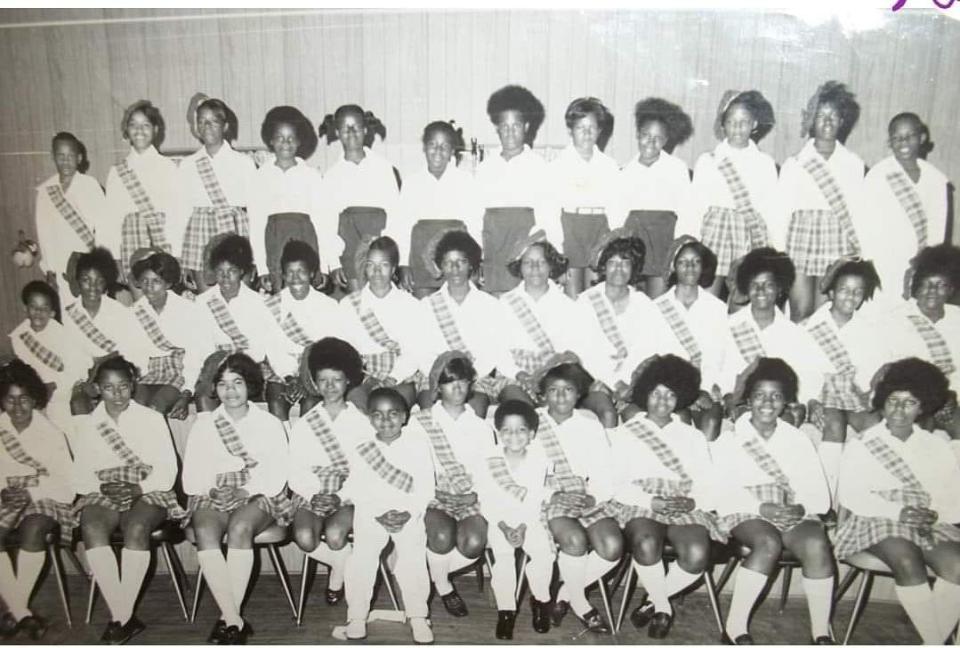
“Mr. Arthur Lindsay was our first drill master,” said Mincy. “He was a tall, good-looking man – and demanded our respect.
After he died, Mr. Jimmy (Wallace) Sr. took over. He, just like Mr. Arthur, looked out for us young ladies. They were very respectful and protective of us – as if we were their daughters. They taught us drills – but also self-respect and pride,” she said.
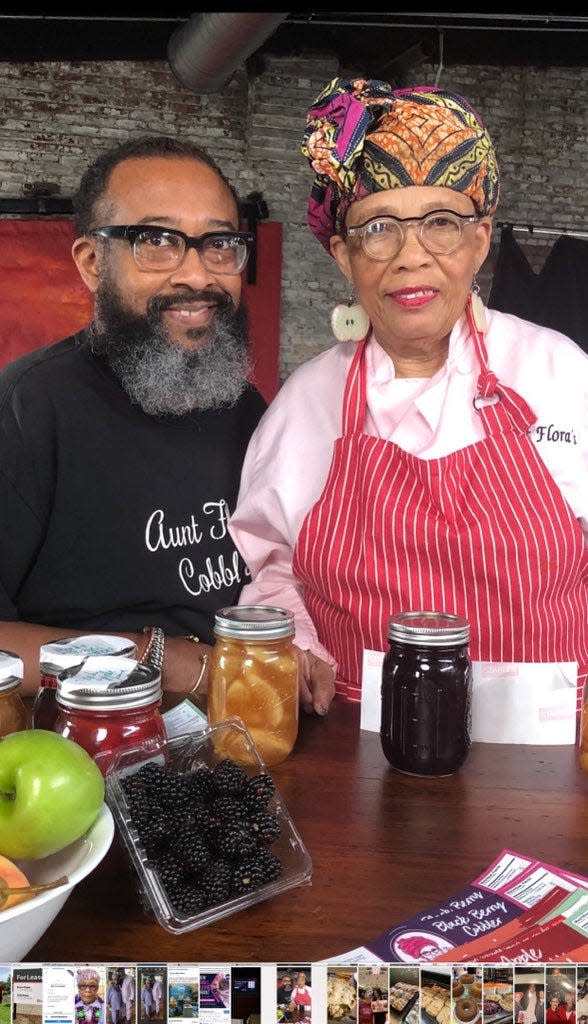
Mincy is affectionately known in Ohio as “Aunt Flora.” She continues the legacy of her Aunt Flora, a Beaver Falls woman who once toured the nation play-acting the role of Aunt Jemima, the pancake syrup brand model. She is a longtime restauranteur and foodie, a successful owner of several eateries in the Cincinnati region. Along with her husband, Ronald Mincy, the couple are co-pastors at Lincoln Heights Missionary Baptist Church, also in Cincinnati.
Jason Wallace, 58, of Newark, N.J., was a young banner-carrier for the Scot-Etts and later, became a member of the Jr. Herd. His father, “Mr. Jimmy,” was a World War II and Korean War Army veteran, he said. The younger Wallace is currently a successful restaurant proprietor in greater Newark.
Annette Johnson-Jackson, 73, is another founding member of the original Scot-Etts. “I recall this as a very special time in my life,” she said.
“I appreciated growing up in Beaver Falls. A small town, but we learned the importance of treating people like we wanted to be treated,” Johnson-Jackson said. Before graduating from Beaver Falls High School, her parents relocated to South Central Los Angeles. There, she graduated from the highly acclaimed Crenshaw High School.
After raising four daughters, Johnson-Jackson, now a grandmother living in McKees Rocks, returned to Pittsburgh 10 years ago, and works in customer relations with the CVS pharmaceutical corporation.
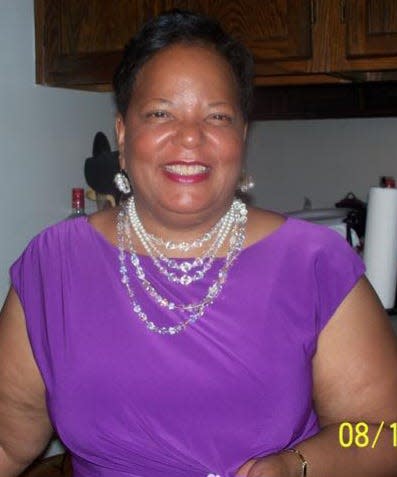
Boys team forms
The Scot-Etts gained national acclaim while performing drills primarily at cities that also housed Elks lodges, including Chicago, Indianapolis, Reading, Harrisburg and Dallas. “We had quite a winning reputation,” reflected Mincy.
Meanwhile, not to be forgotten, in the late 1960s, an Army recruiter from California settled in Beaver Falls to work at the city’s recruiting office on the main street, Seventh Avenue.
Robert Jackson, a sergeant first class in the U.S. Army, was approached by Elks officials to help start a boys' answer to the successful Scot-Etts.
By 1971, several teenage boys were recruited to join what was dubbed the Jr. Herd – a takeoff on the young herd of Elks, as explained by Mark Jackson – one of the Herd’s founding members. “Sarge was a special guy,” he said.
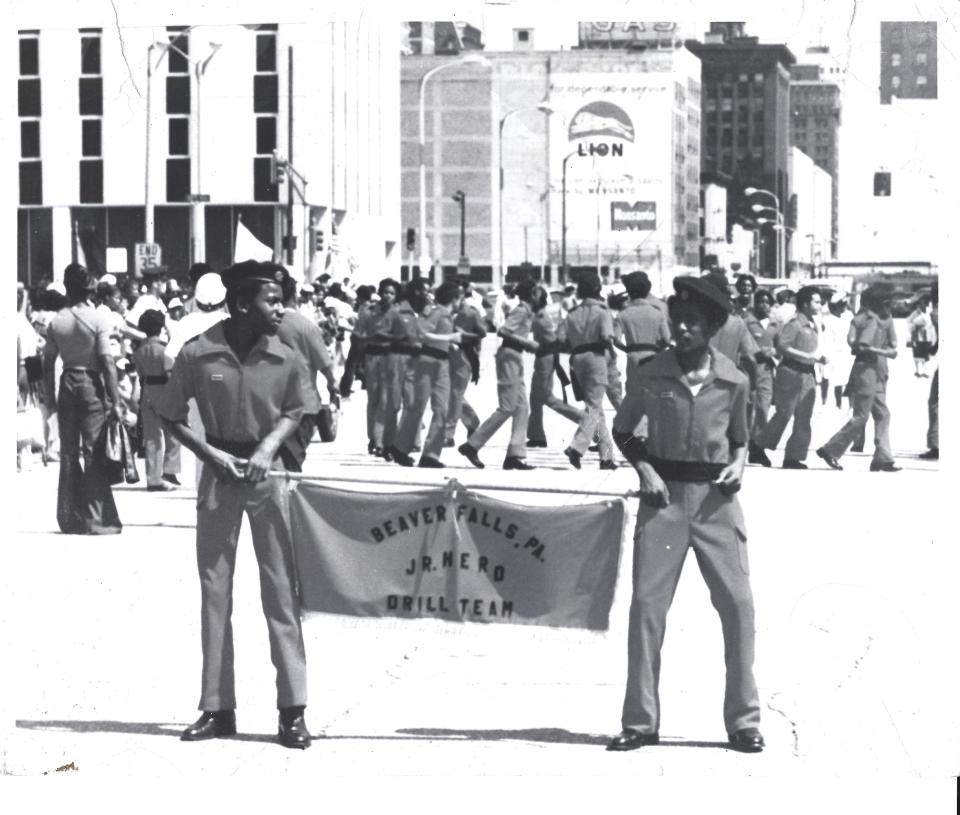
“We had about 20 guys initially, but as time passed, by the mid-70s, we were up to nearly 50 members,” Jackson said.
The experience of learning special military-style drill steps ultimately had a longtime impact on Jackson and another 1974 Beaver Falls High classmate, Rufus Ford.
“We decided to join what was then called the VOLAR, or Volunteer Army,” said Jackson, 68.
“My drill team experience definitely had a positive impact on me,” he said.
After experiencing 30 years of military life before retiring, Jackson and his family settled in Augusta, Georgia – near the former Fort Gordon, recently renamed Fort Eisenhower.
James “JC” Caracter, of Somerset, N.J., also fondly recalls his youthful days in “The Falls."
"I remember when we first started the Jr. Herd. We were influenced by a drill team from Reading, Pa. They came to Beaver Falls during an Elks convention. We saw them marching and were overly impressed. And the girls went crazy – so you know we were ready to start our own team.”
For Caracter, a three-sport athlete at Beaver Falls and Blackhawk high schools, he joined ranks with several of his past teammates and friends from Harmony Dwellings and under Sgt. Jackson’s tutelage, the Jr. Herd became a popular entity throughout the city.
After a successful career as a railroad man, Caracter is a "content grandfather" having retired from the New Jersey Transit Company.
Lasting impact
By the mid-1970s, the Jr. Herd had earned a strong reputation as one of the premier drill teams throughout Pennsylvania. They also earned national status by winning tournament competitions in Chicago, St. Louis and at regional and statewide Elks clubs, including Mount Union, Pa.
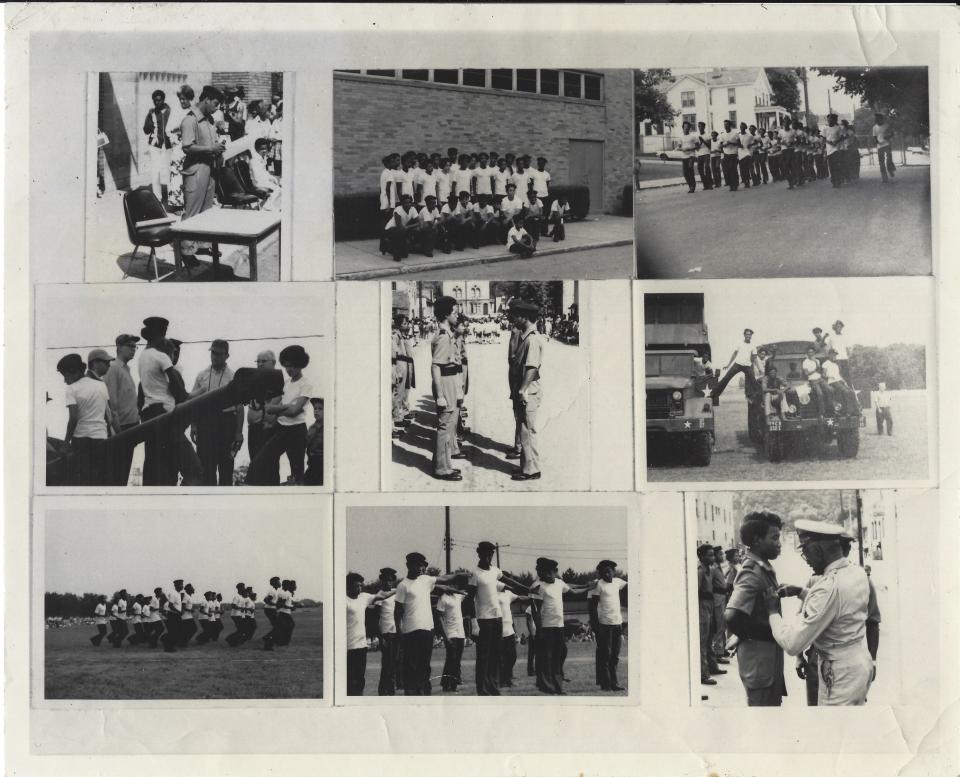
Alexander “JP” Pugh, fondly recalls his days as one of three main cadence “callers” leading the drill team during parade routes. Edmund Dreher and Terry “Booker-T” Wiley were the other two parade callers, he said. Both Dreher and Wiley enjoyed successful military careers – Dreher in the Air Force and Wiley as a decorated Army officer. Wiley’s two brothers Desi Wiley and Kevin Wiley, were both Herd members who also served lengthy stints in the U.S. Armed Forces.
Pugh says the drill team had lasting positive impacts on himself and his young brethren. The callers often incorporated the “Jody: Sound Off” call during parade routes he said. The "Jody" cadence was created by a Black World War II veteran named Willie Lee Duckworth Sr. of Sandersville, Georgia.
Now 68 and retired from the auto sales industry in Detroit, Pugh and his wife, Ola Pugh, also own a successful child-care facility on Detroit’s west side. Pugh also served time in the Army as a medical specialist.
Caracter recalled older Beaver Falls gents who ran the Elks Club. “Men like Leon Glover, Gus Green, Howdy Mason, Calvin Smith and J.T. Brown – they were influential in the city and kept a certain order at the club, he said.
While all those men are deceased, Linwood Alford, 80, is still around to confirm the importance of elder leadership in keeping order amongst the youths.
“I was a member of the business and entertainment committees,” Alford said. “Both drill teams were valuable reflections of our Elks Club and our city – especially when we traveled to various cities,” said the Vietnam War Army veteran.
Desiree Lindsay, 66, said her father, Arthur Lindsay, had a major impact on the Scot-Etts.
Desiree also credits her aunt, Thelma Lindsay Barrett, and Margaret Anderson as being instrumental in Scot-Etts’ origin and as chaperones for the young ladies.
“My dad was an Army veteran and really took his role seriously and had a passion to instill leadership qualities in our members while he was alive.”
Arthur Lindsay died not long after the Scot-Etts were conceived, said Desiree. Two other sisters Denise Lindsay-Tapp and Doretha “Ree-Ree” Lindsay were also members. Her brother, Lawrence “Bugga” Lindsay was a Jr. Herd member. “It was definitely a family affair for us,” said Desiree, a former Beaver County Courthouse official.
Anthony Mitchell, professor emeritus, African American Studies at Penn State University, said drill team marching, or “stepping,” has origins in traditional African cultural expression and combined military style stepping with intricate, synchronized movements using the feet, hands, and body.
Mitchell, 68, elaborated further that in the early 20th century, African-American fraternities and sororities performed “step shows” by infusing singing, spoken word, chanting, clapping, and complex footwork to represent their organizations in competitive performances.
“In Beaver Falls, the Scot-Etts and Jr. Herd were exceptionally well-trained drill teams and competed against the best teams in the nation,” said Mitchell, a Beaver Falls native with an education doctorate.
“Their dynamic execution of precision drills and creative Black dance styles fostered racial and community pride among youth and adults, were highly entertaining, and very competitive.”
While boys' uniforms and tam hats resembled the Black Panthers political party of that era, both drill teams were apolitical and of course, non-violent, Mitchell said.
“They embodied the “Black is Beautiful” and the “To Be Young, Gifted, and Black” spirit of the times.”
Connie Anderson, 73, was a member of the Homewood-based girls drill team. "Mainly, we had lots of fun. I also recall how spectators would follow us down the parade route, along with the Westinghouse High School Band," she said. "That's when parades occurred in Homewood on a regular basis – on Frankstown Road and Hamilton Avenue.
The Rev. Alvin Jerry Walker, 67, was a proud Jr. Herd member and recalls the positive influence membership had on young African-American teenage boys at that time. “It was definitely a good influence on us. It provided a sense of camaraderie and brotherhood, that – sadly enough is missing from many of today’s youth,” said the pastor of Love Hope Fellowship Church in Winchester, Virginia.
Walker, also an Army veteran, recently invited several of his Jr. Herd brethren to his Winchester home and church, as a long-overdue reunion. “It was certainly good to see the guys again, considering we’re now older and life’s not promised to any of us – at this stage in our lives,” he said.
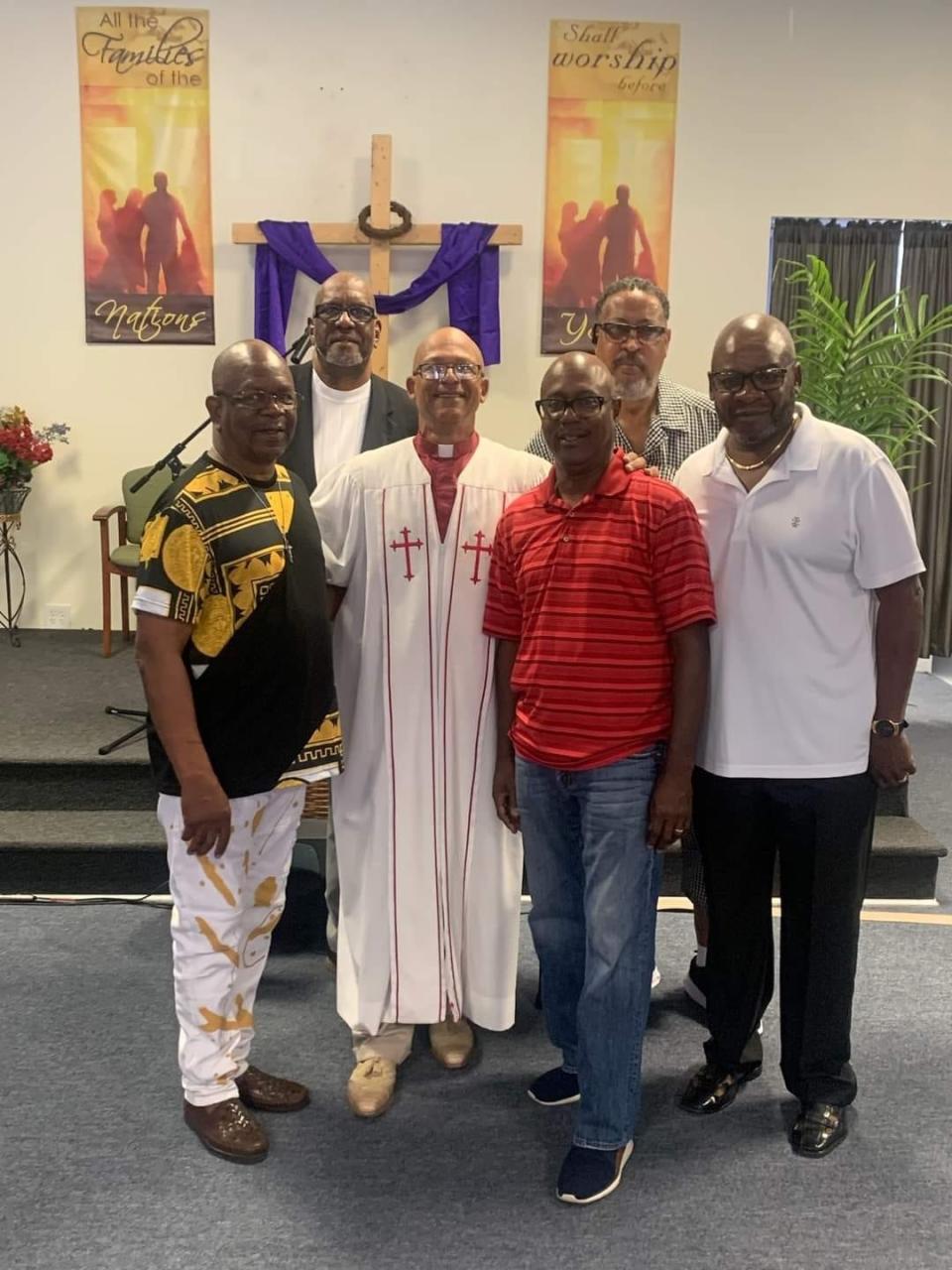
The end of an era
By the early 1980s, both male and female units had run their courses and today, they no longer exist.
Mark Jackson and Caracter, agree that once older members graduated high school and matriculated to college and the Armed Services, neither drill unit was able to sustain its existence.
Darryl “Boogie” Dunn, 78, is a Black music historian and Homewood native who concurs with Mitchell that most Black Elks clubs were special social halls unique to the Black community.
“During that era, mostly all the area Elks clubs sponsored drill teams. They were in the Hill District, Homewood, East Liberty, North Side, and especially in smaller towns like Clairton, Duquesne, Aliquippa, Sewickley, Rankin, “Little” Washington and McKeesport."
Unfortunately, most of those Elks clubs suffered the same fate as the Beaver Falls club,” Dunn said.
In 2016, the Elks Club on Seventh Street in Beaver Falls was razed and burned down when city officials deemed the facility a “nuisance bar” following a series of criminal activities that occurred outside the building during night-time social hours.
“It’s sad,” said Alford, “we no longer have our own private social club.”
Timothy Cox is a Beaver Falls native and graduate of Point Park University’s Journalism-Communications Department. He also attended Slippery Rock University and the Community College of Beaver County. He freelances for several publications including the Beaver County Times and publications in Baltimore, Washington, D.C., Atlanta and Augusta, Ga.. His email contact is teacawks2@gmail.com.
This article originally appeared on Beaver County Times: Black co-ed drill teams once signaled community pride in Beaver Falls

